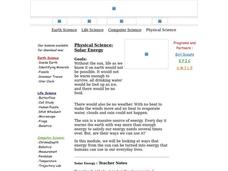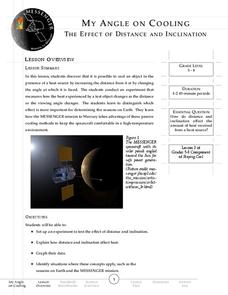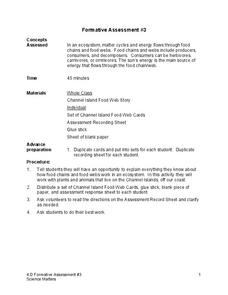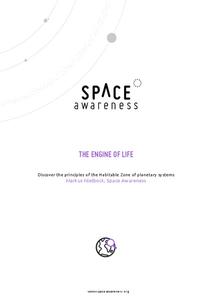Curated OER
Energy
Students are introduced to the concept of energy. After observing a demonstration, they identify the sources of heat and the ways heat can change objects. In groups, they travel between stations to view different demonstrations dealing...
Curated OER
Star Power! Discovering the Power of Sunlight
Students estimate the energy output of the sun. They estimate how much power sunlight the sunlight provides to the earth. They build a simple device to measure the amount of solar radiation the earth receives from the sun.
Curated OER
Energy Detective Worksheet
In this energy learning exercise, students explore their environment to find items that use energy. Students then write a definition of energy. This learning exercise has 1 graphic organizer and 1 short answer question.
Curated OER
Energy Sources -- Windmill Competition Investigation
Pupils work together to use an anemometer to measure wind speed. They use their anemometer to complete different experiments. They work together to design their own windmill.
Curated OER
Fossil Fuels vs. Alternative Fueling Systems
Fourth graders brainstorm the differences between the fossil fuels that people use in their transportation now and what they could use to minimize greenhouse gas emissions. They use a variety of techniques from webquests to writing...
Curated OER
Solar Energy
Students investigate solar energy. They explore ways that energy from the sun can be turned into energy that humans can use in our everyday lives. In various experiments, they explore the effect of clouds and dust on photovoltaic energy...
Curated OER
Exploring Electricity - Four Activities
These are four classic activities used for instructing upper elementary electricians. The first involves experimenting with the Van de Graaff generator. The second is a series of hands-on experiences with static. In the third activity,...
Teach Engineering
Light vs. Heat Bulbs
Careful, that light bulb is hot! Compare heat and light energy using a simple light bulb. The exercise addresses energy conservation and presents actual calculations to determine the most cost-effective light bulb.
Messenger Education
My Angle on Cooling—Effect of Distance and Inclination
When exploring Mars, spacecrafts are exposed to 5-11 times more sunlight than when near Earth. Groups of pupils complete a hands-on activity to explore how distance and angle of the sun affect temperature. Through discussions, they then...
Columbus City Schools
Keeping It Hot!
Hot off the presses, this collection of thermal energy activities, lessons, and printables is sure to amaze. Demonstrate how thermal energy moves about in a system using simple materials. Pupils demonstrate their understanding...
Science Geek
Reaction Kinetics
Show your classes the science behind rates of reactions with a presentation that explains factors that affect the rate, activation energies, exothermic and endothermic processes, and the proportionality of the product and reactant...
Dick Blick Art Materials
Matisse Prints du Soleil
The sun provides the link between this art and science activity. Kids use sunlight (or light from an artificial source) to produce heliographic prints on fabric or paper.
Colorado State University
What's the Difference Between Blue Light and Red Light?
Finally, an electromagnetic spectrum lab that will get glowing reviews from your class! Explore the nature of light using red and blue LED sources and fantastic phosphorescent paper. Young scientists compare the effects of blue light...
Colorado State University
If Hot Air Rises, Why Is it Cold in the Mountains?
Investigate the relationship between temperature and pressure. Learners change the pressure of a sample of air and monitor its temperature. They learn that as air decreases its pressure, its thermal energy converts to kinetic energy.
Science Matters
Formative Assessment #3
Thirteen short-answer questions follow a brief food web activity in a formative assessment designed to test knowledge of ecosystems and the energy that flows through them.
NOAA
Animals of the Fire Ice
When the sun's rays can't reach the producers in a food web, where does all the energy come from? Extreme environments call for extreme food sources. Young scientists investigate creatures that appear to get their energy from methane...
Space Awareness
The Engine of Life
There is a specific zone, or distance from a star, that a planet must be in order to have water in a liquid form. The activity demonstrates how flux density depends on its distance from the source. A photovoltaic cell gets power to...
PBS
Rubber Band Car
Class, start your engines. Future engineers design a car with old CDs as wheels. The power source? Some rubber bands will do the trick! This is the first installment of a five-part series.
PHET
Band Structure
Electricity travels at the speed of light, 186,000 miles per second. Through a simulation, classes see how the structure of energy bands in crystals of atoms determines how materials conduct electricity. Participants can change the...
Cooking Matters
Happy Whole-idays
Take a look into how whole grains support growth, provide energy to play, and help us to stay strong with a fun-filled resource. The worksheet offers interesting food facts, an exercise in nutrition label reading, a recipe...
Curated OER
Energy From Wind And Moving Water
Second graders investigate air and water as two sources of energy. They determine that wind and moving water are renewable resources that have advantages and disadvantages in their use. Through the design and construction of wind- and...
Curated OER
Energy from the Sun
In this energy from the sun instructional activity, students are given 20 terms to complete sentences about the sun, the energy of the sun, the radiation of the sun, the transfer of energy from the sun and the currents created by the...
Curated OER
Sound Energy
Sixth graders understand properties and behavior of heat, light, and sound. They describe the production of sound in terms of vibration of objects that create vibrations in other materials. Students describe how sound is made from...
Curated OER
Class Presentation on Coal
Did you know that coal was formed from plants? After being assigned a coal-related topic, groups gather, organize, and present information about this energy source. The presentations should include visuals like graphs, charts, tables,...
Other popular searches
- Alternative Energy
- Alternative Energy Sources
- Alternative Fuels
- Alternative Energy Worksheet
- Renewable Energy Resources
- Alternative Energy Forms
- Alternate Energy Sources
- Renewable Energy Sources
- Sources of Energy
- Types of Energy Sources
- Alternative Energy Resources
- Exploring Alternative Energy























